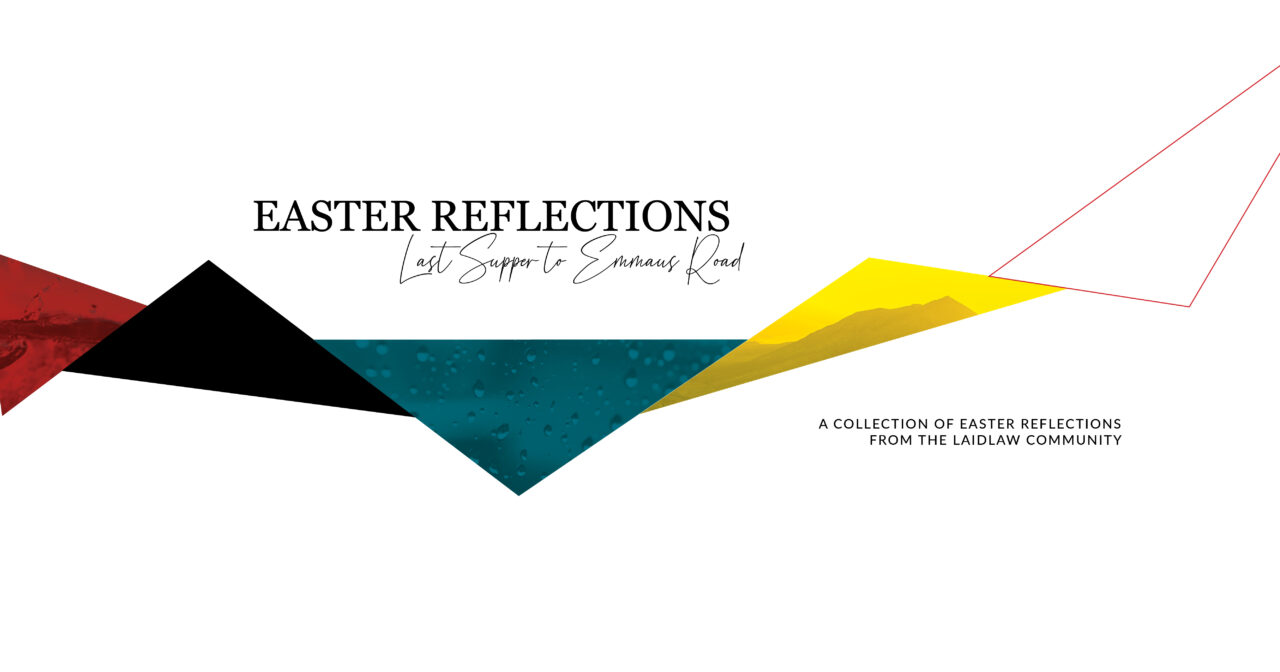Easter Reflections 2020
Over this Easter weekend we have some written reflections scheduled to help mark this time - to set it apart from the rest of our ordinary days in lockdown. We will also be including some music you could listen to as you reflect.
Here is our prayer and blessing for you and your bubble this Easter:
May you find the time, connect in the places, and encounter the living God where you need to be met and found this weekend.
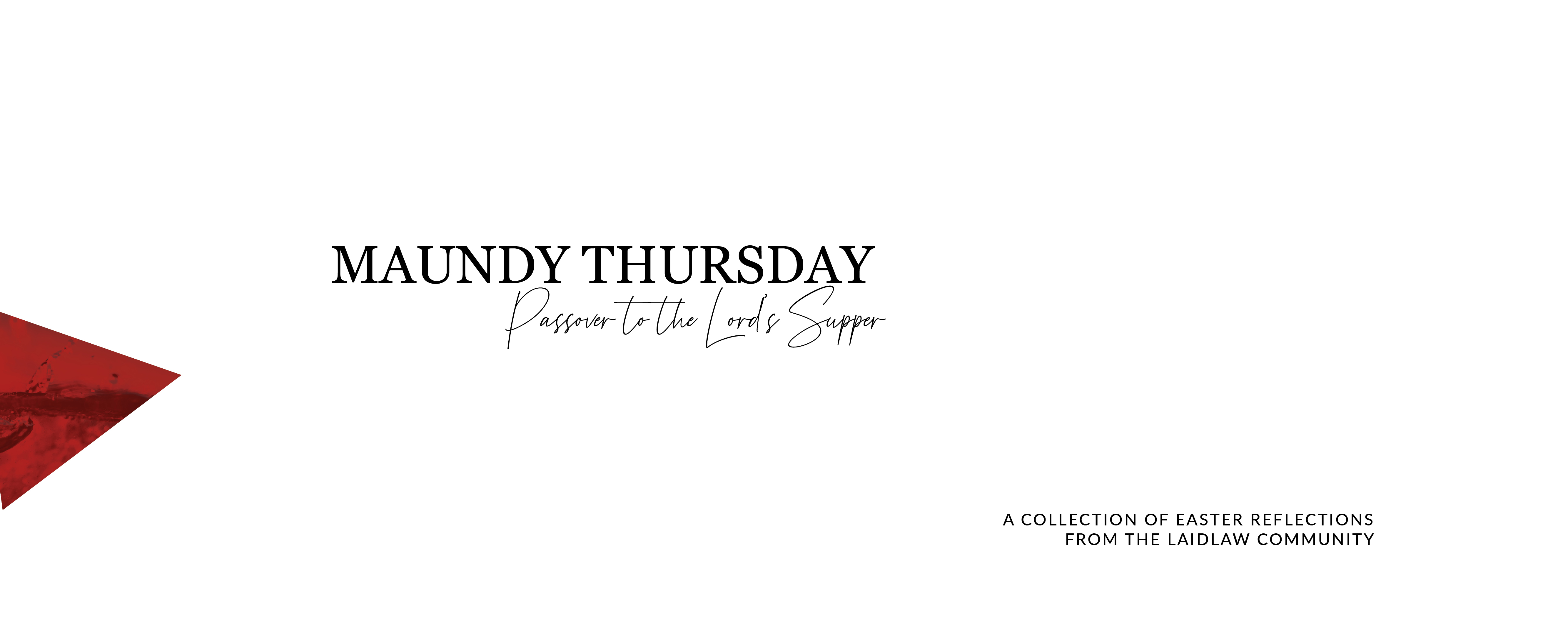
Passover to the Lord’s Supper | From Egypt to Aotearoa
‘Maundy Thursday’ is the Thursday of Holy Week when Christians remember Jesus eating the Passover meal with his disciples and bringing ‘the Lord’s Supper’ to life. Some Christians mark this day with foot-washing services. Others partake in different kinds of celebratory and commemorative meals. In the Old Testament and gospels we read about the Passover meal as one of the Jewish festivals. It was a mandated observance for all Jewish people. This identity-forming shared practice helped them remember God’s story. The meal is intended to be a kind of living story.
Because Jesus came, Christians don’t have to observe Passover annually the way we see the festivals celebrated throughout Scripture. In fact, Jesus gave us a new celebratory meal when he came – the Lord’s supper or communion. We, as ‘gentiles’ who have been grafted into Jesus’ whakapapa, are still connected to the remembrance and celebration in both of these stories through Jesus himself. And we can learn about the same God who delivered his people from slavery in Egypt by sitting down and reflecting on some of these traditions.
On this strange Thursday of Holy Week, when Christians around the world are not gathering in person, some of our community gathered online today to remember the Exodus story and share the Lord’s supper together. We enjoyed this meal, remembering that Jesus was Jewish and would have grown up sharing this feast with his family every year. And in the middle of his context, he offered Christians a way to join in with God’s ongoing story of redemption and renewal by giving us a new Passover meal – the eucharist, the Lord’s supper, communion.
FOR READING
We wanted to share this resource with you – for perusing or for participating! Have a read, or go ahead and follow this script and bring it to life within your bubble.
FOR LISTENING
Here is a piece of music if you would like to reflect on the events of Jesus’ Thursday by listening. The Latin words mean Lamb of God, who takes away the sin of the world grant us peace. Agnus Dei by Rufus Wainwright
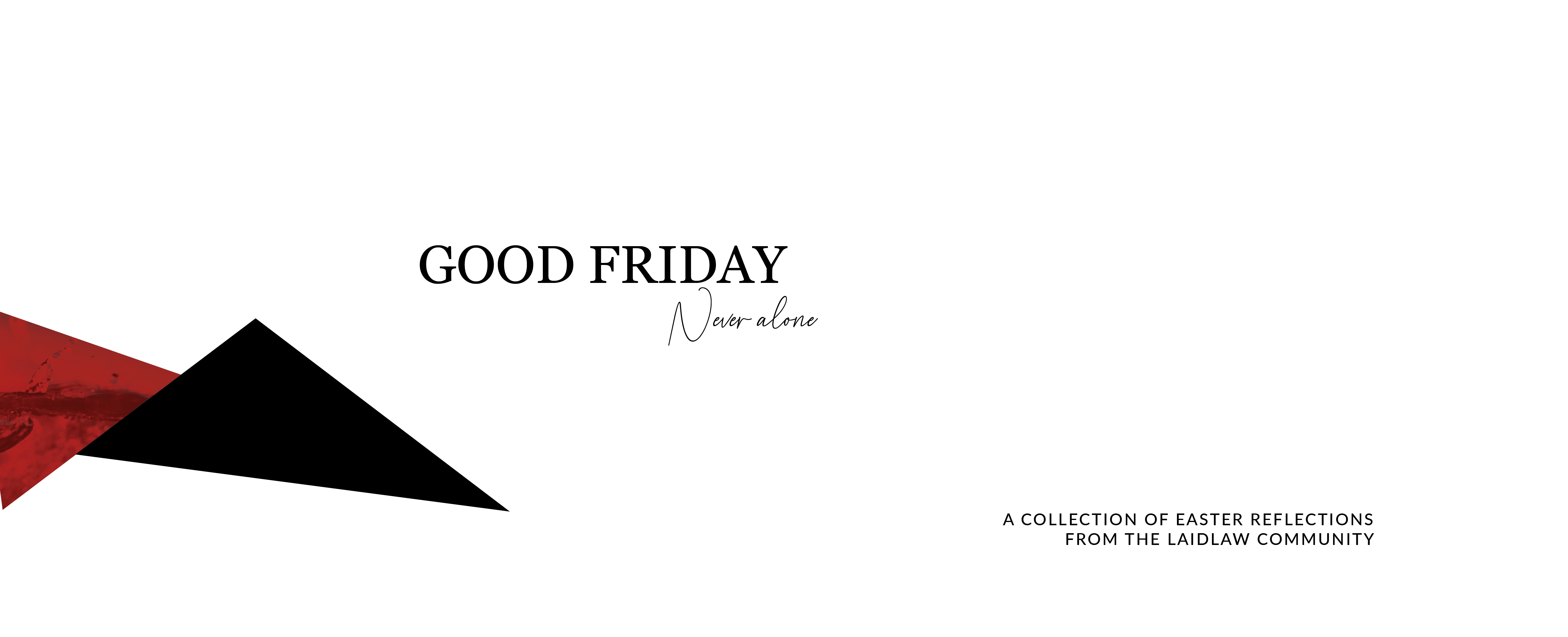
Never Alone
Matthew 27:45-46
From noon on, darkness came over the whole land until three in the afternoon. At three o’clock Jesus cried out with a loud voice, “Eloi, Eloi, lema sabachthani?” which means, “My God, my God, why have you forsaken me?”
I hear these words of Christ today. I breathe out; my eyes close.
A man is walking two hundred miles from Delhi to reach his family, and he falls to the earth, alone. A woman trembles in a hospital bed, alone, kept from the touch of her beloved, her world a blur of masked faces, panicked movement, piercing alarms. My 97-year-old neighbour sits in his armchair and sighs, alone. Isolation is not new to him; he has lived in this chair for years. I feel an ache, see a cloud: a loneliness, a darkness that for many covers the land.
I see Jesus. He steps out of an upper room, from the warm light of communion, into deepest night. He climbs the Mount of Olives, the hill David ascended as he wept over a betrayal and prayed for deliverance. Jesus weeps and asks this cup be taken from him; his closest friends sleep. I see an empty kiss, a secret arrest, his desertion in the garden. Then the priests mock him; Peter disowns him; Jerusalem turns against him; the soldiers salute him, strike him, spit on him, scorn him. The crowds part before him as he stumbles to Golgotha.
I see the cross: a King lifted up for public humiliation. His enemies laugh and hurl their insults. The bandits at his right and left hand throw their taunts.
A cloud covers the land; darkness at the height of day. Jesus is still. He who knows perfect communion with the Father enters the heart of our night, experiencing “in all its fullness and all its horror the suffering of loneliness,”[1] a feeling of complete desolation, of forsakenness even of God. He cries out. In him, the words of the twenty-second psalm find their full meaning. He prays them for our sake. “Now we know,” Bonhoeffer writes, “that there is no longer any suffering on earth in which Christ, our only helper, is not with us.”[2]
Under my breath, I pray the psalm with Christ, in him, knowing that, somewhere in the world, another member of his body is participating in his loneliness, and praying his prayer. His prayer is theirs, and because we are one body, it is mine.
Yet, even as I pray his words, I know, somehow, that we are not alone. Because God entered our night in Jesus Christ, because he fills even the unfathomable depths of this psalm with his divine presence, though we walk through the valley of the shadow of death, we are, in the words of one of our own,
Never alone.
Never any breath alone.
Never a thought or quiver alone of any kind.
Never a beat or pulse or love for any
human soul alone.
Alone is impossible, alone is death
but even then, never alone.
Alone would be to live without
the womb of Divine oxygen surrounding
human spark and cell – there can be no alone.
Not even for enemies.
Not even for emptiness itself in its vast taunts
and separation intent.
There can be no alone.
There is no space not filled with Divine presence,
nor the envelope of Creator breath.
Alone is invention, lowbrow imagination
built to shelter human shame,
the weapon that tried to slay its maker.
Yet, even still,
never alone.[3]
-Strahan Coleman
Ryan Lang, Graduate Teaching Assistant, School of Theology
FOR LISTENING
https://www.youtube.com/watch?v=u2I_SA7fzpU&feature=youtu.be
[1] Gordon Huelin, The Light of the Cross (London: Geoffrey Bles, 1969), 57.
[2] Dietrich Bonhoeffer, Life Together and Prayerbook of the Bible, ed. Jr. Floyd, Wayne Whitson, trans. Daniel W. Bloesch and James H. Burtness, English Edition ed., Dietrich Bonhoeffer Works (Minneapolis: Fortress Press, 1996), 170.
[3] Strahan Coleman, Prayer Vol.01 (New Zealand: Strahan Coleman, 2019), 10.
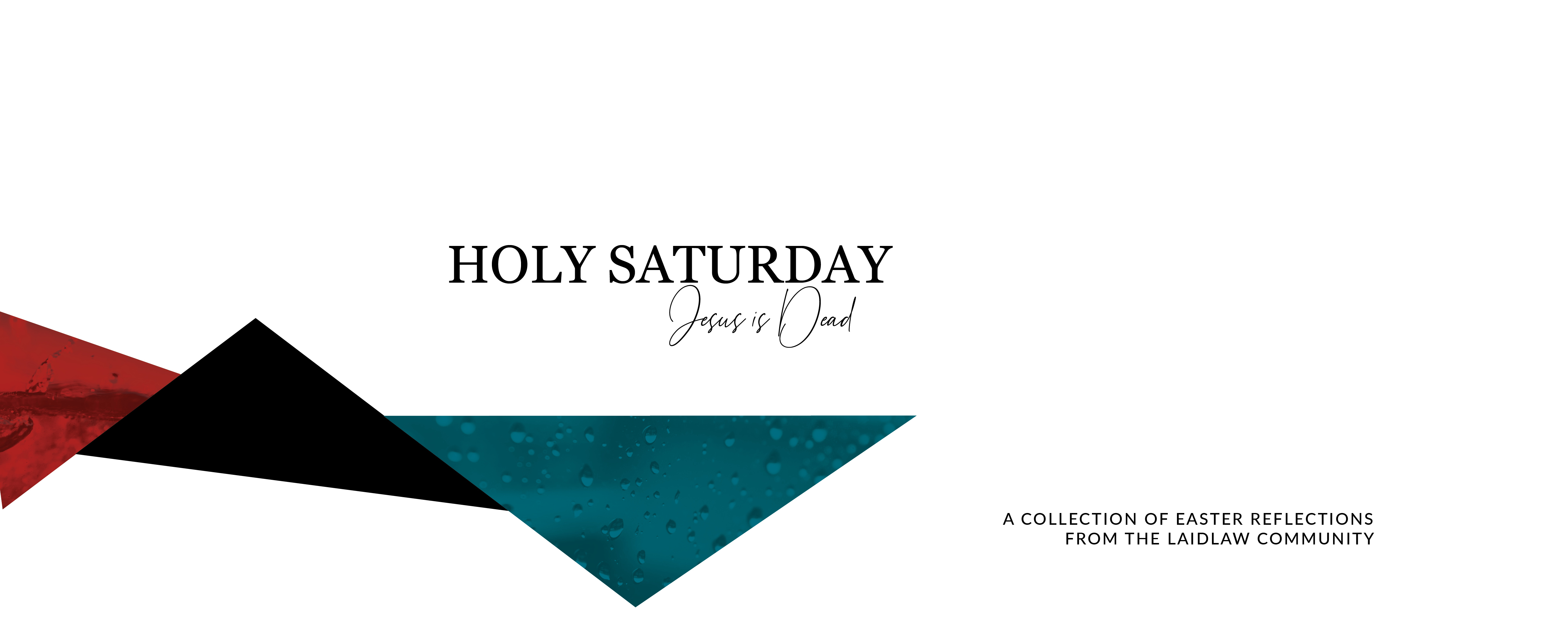
Jesus is Dead
Luke 23:55-56
The women who had come with him from Galilee followed, and they saw the tomb and how his body was laid. Then they returned, and prepared spices and ointments. On the sabbath they rested according to the commandment.
Holy Saturday is the mysterious day in between Jesus’ death and resurrection. Mark, the gospel writer, notes that some of Jesus’ followers and friends spent this time weeping and mourning. The women gathered spices, but then went home and rested. Their beloved Messiah, Saviour, hope of Israel - was dead. Some Christian traditions have prayers and traditions that accompany this in-between day and others skip right over it as if it were simply a convenient shopping day wedged in the middle of holy-days when shops are closed.
In recent years ‘Holy Saturday’ has become a more meaningful part of my Easter observance as a theologically significant middle place between death and life. This has grown as I have discovered connections between trauma, suffering, and the resurrection. As a counsellor who works with survivors of trauma, I have found the ‘middle space’ of Easter Saturday helpful - a kind of gift. It articulates a hope that resonates more accurately with the lived experience of survivors of trauma. The hope of Holy Saturday is barely there – just a hint, and both complex and nuanced. It makes space for death in the aftermath of trauma without rushing too quickly into life. It allows for silence, mystery, and grief to linger before new life bursts forth. Death and grief do not have to be forsaken for hope and healing to begin.
In the aftermath of trauma, death lingers. This can be the literal experience of death, or a more meta-physical death which can include a loss of fundamental assumptions about the world and how things are. There may be a glimmer of hope, but there is still death. On Holy Saturday, Jesus is dead. We grieve with the women. The resurrection has not yet taken place. And so we rest without forcing anything else to happen.
This Easter is like no other. In our bubbles, across Aotearoa, we are ‘in-between’ the potential devastation of a pandemic and the hope of a country freed to continue life anew. Before we race towards the resurrection hope that comes tomorrow, we can sit and reflect in this in-between day to help us make sense of our current experience before we start moving towards the resurrection (tomorrow) and life beyond our bubbles.
The experience of this global pandemic could be considered a form of trauma. What used to be our ‘ordinary everyday lives’ is no longer ordinary. We have missed out on birthdays, sporting events, musical performances, weddings, and even funerals. The world has changed and we have changed – and we don’t yet know how. But we do know that some of the fundamental assumptions we hold about the world have died. Like the women who were preparing to anoint Jesus’ body – we can rest and grieve. In fact that may be the best thing we could to today.
In this middle place of death and not-yet-resurrection it is not human striving, but the Holy Spirit who witnesses to the tentative and fragile existence of life and hope. And so today, may you bear witness to the Love that remains in this middle place, where ‘how life was’ looks uncertain and fragile but hope, however tentative, remains.
Lisa Spriggens (Head of Counselling) with Lisl Baker (Culture and Relationships Coordinator)
FOR LISTENING
We are including two pieces for musical reflection on this quiet, holy day.
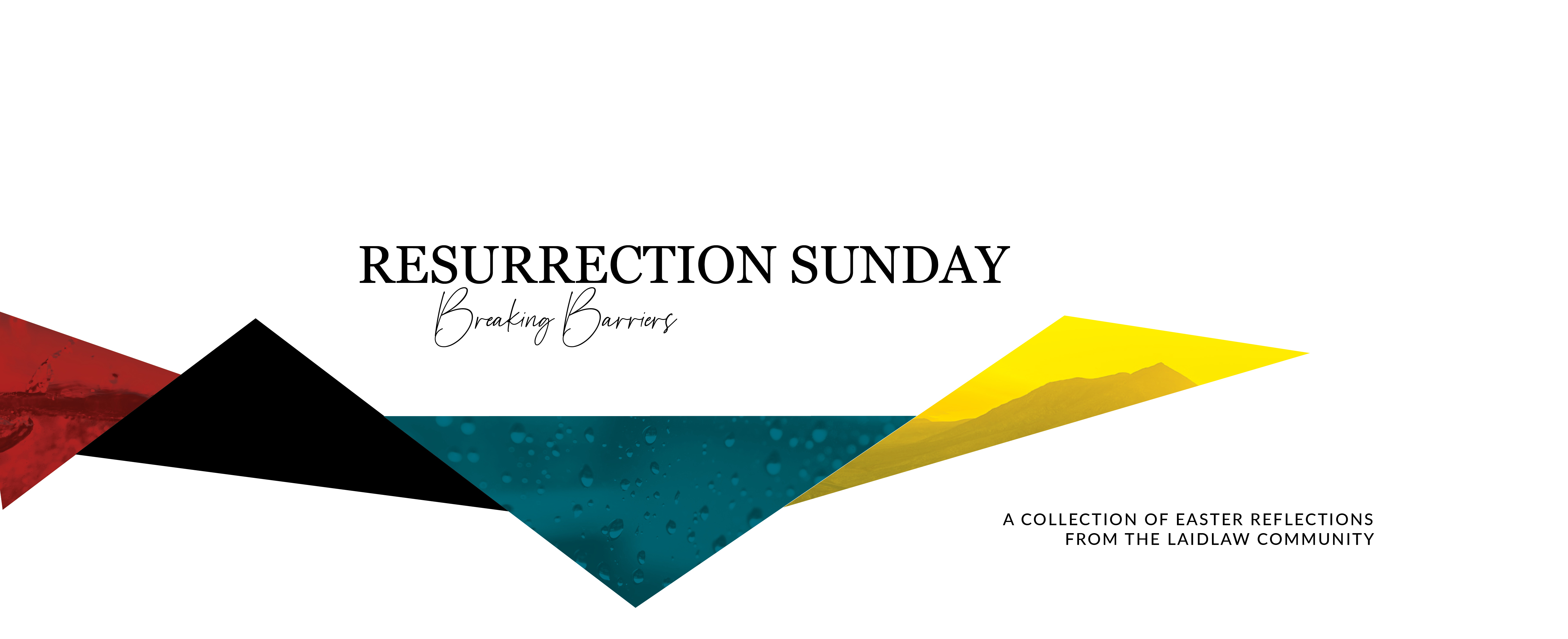
Breaking Barriers
Luke 24:5
The women were terrified and bowed their faces to the ground, but the men said to them, “Why do you look for the living among the dead? He is not here, but has risen.”
Typically, at Easter, Christians across the globe gather in churches to worship and celebrate the death of Jesus Christ on Friday and his glorious resurrection on Sunday. But not this Easter. We are in the middle of a lock-down. But, while traditional church services are cancelled, this does not mean Easter is cancelled. Easter is being celebrated in family bubbles around dinner tables, and en masse online.
What is the meaning of Easter Sunday? And what does that have to do with COVID-19 and the problems we face in our real lives? Easter is about how God breaks down every barrier that exists to enter into the closest of relationships with us and make it possible for us to find our fulfilment, purpose, peace, and joy in him. In a world of fear and dislocation caused by isolation, sickness, and anxiety, we need to hear the words of comfort again, and of peace, and love. Easter speaks just these words over us.
A barrier-breaking is seen in the resurrection of Jesus on Easter Sunday. Here, the barrier is a massive stone that seals his tomb. The kind of tomb in which Jesus was buried was shaped like a house. At the entrance to the ‘house’ was a door—a sealing stone. The difference between the tomb and a house is that a house and its door are designed to open while the sealing stone on the tomb is meant to be permanently closed.
The sealing stone at the tomb was a symbolic barrier between this world and the next. The women who first came to Jesus’ tomb witnessed this barrier removed—the stone had been rolled away—Christ had risen! “The women were terrified and bowed their faces to the ground, but the angels said to them, ‘Why do you look for the living among the dead? He is not here but has risen’” (Luke 24:5). Christ had left the tomb, departed from this world and, in doing so, tore the heavens apart and opened up human access to God.
COVID-19 is the latest in a long list of barriers in life. Fear, loneliness, panic, anxiety, and a host of other emotions lurk close to the surface for many people, and the Easter message is that God is not unaware of how we feel, nor is he passive in the face of such challenges. COVID-19 has put up barriers between us. Most of us can no longer be in our usual vocational, educational, or leisure spaces. But God has no limits and offers us a new perspective.
Easter Sunday is about the resurrection of Jesus Christ. It is about Jesus breaking down every barrier that separates humanity from God. Birth and death are mysteries and, in between, we live beneath the sky for a while in our frail little dwellings. We enter life through the door of a woman’s womb; we enter God’s presence through the door of a house of worship; we enter eternity through the door of a tomb. God, who loves us, breaks into our world, passing through the barrier of the sky to walk with us.
Dr Myk Habets, Head of Theology
FOR LISTENING
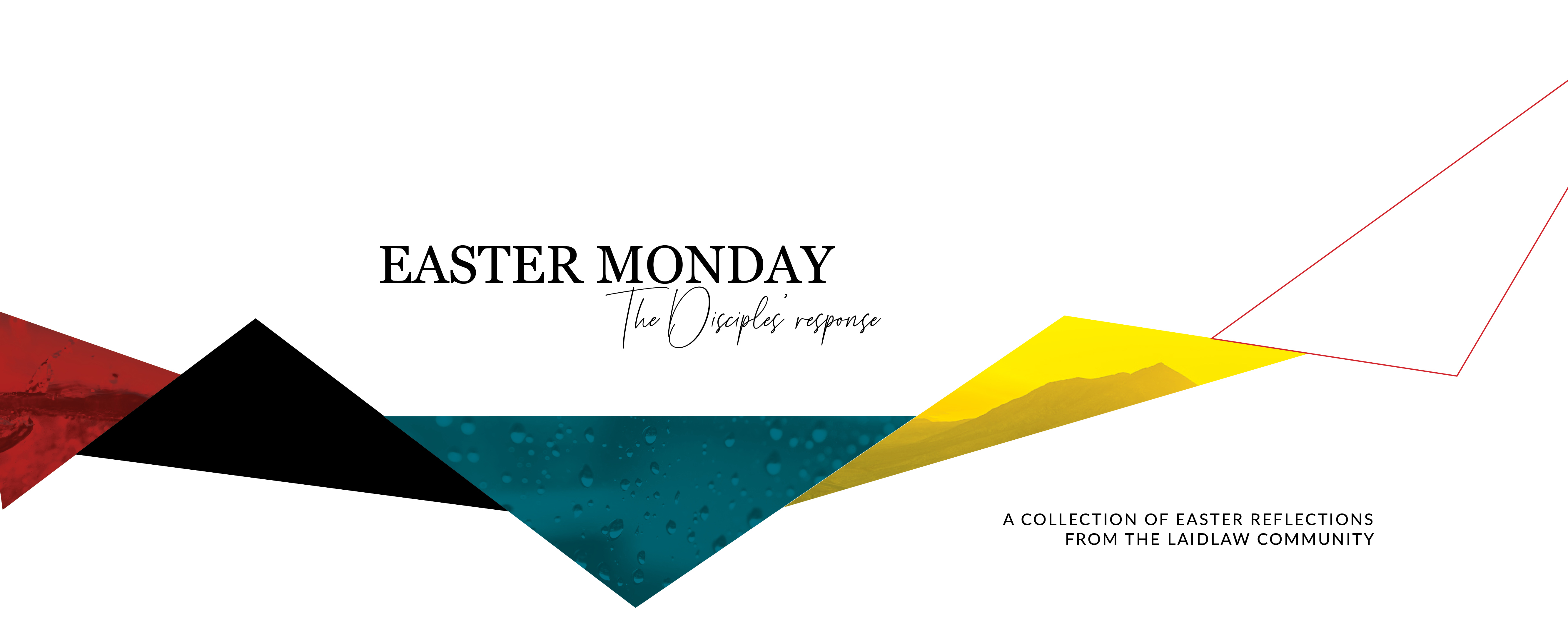
The Disciples' response
Luke 24:18
“…are you the only stranger in Jerusalem who does not know the things that have taken place there in these days?”
Imagine the two disciples walking to Emmaus. The Rabbi they had followed, believing him to be the hoped-for redeemer, had been ignominously crucified. As Herod’s palace, Pilate’s barracks, the Temple, and Golgotha receded into the distance, a man joined them asking questions. But this man responded to their exhausted incredulity with an unexpected Biblical history, explaining how Abraham, Moses, David, Jeremiah, Nehemiah and all Israel’s threads of promise and expectation had been pointing to Jesus’ suffering on the cross.
Imagine living your whole life waiting for a moment of glorious triumph, as part of a people who had been waiting for centuries, to discover that you didn’t recognise it in the public execution in front of you. Imagine discovering that God occasionally walks the road to Emmaus to talk with his friends.
Others discovered God on roads in different directions – Damascus, Caesarea, Ethiopia, Rome – they too asked “who are you Lord?”
Easter Monday is an extra day of rest in our calendar. It is the day after we mark the most important event in history – the resurrection of God; the resurrection of humanity.
It is a day when we do well to ask, “who is Jesus to us?” Is He the Jesus who emerges from the story of the Bible – the longed-for answer to the questions of prophets, judges, exiles, widows, kings and orphans? Is He the one whose story surprises and subverts our expectations – redefining everything we had hoped for?
Luke 24 redefines what leaving Jerusalem means. No longer an Exile of disappointment, despair or delayed promise, but now a call to take the story of Jesus to the ends of the earth.
At a time where fear and human fragility are everpresent in our public imagination, we need disciples who respond to the Lord they recognise and know within Scripture’s story. Disciples who rush back to Jerusalem to pick up and bear their crosses they left behind.
Dr Roshan Allpress, National Principal
FOR LISTENING
Baba Yetu (The Lord’s Prayer in Swahili)
